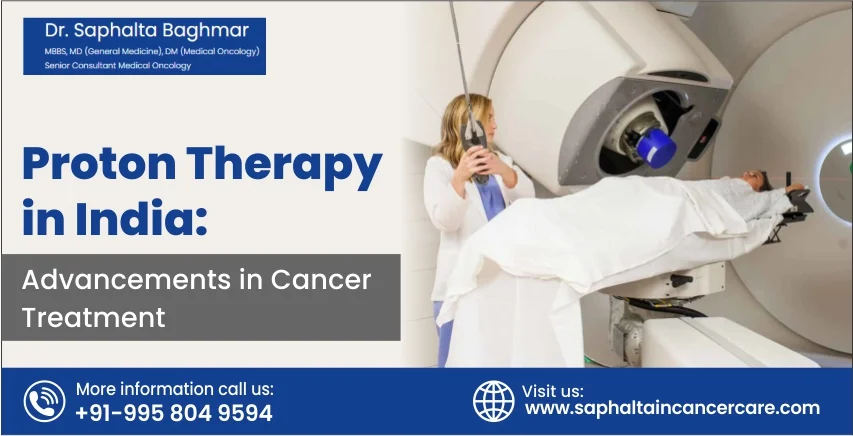What is the need for targeted therapy?
Cancer cells are formed as a result of genetic alterations/mutations, leading to excessive multiplication of these cells and their spread to other organs.
These mutations can be precisely targeted with specialized medicines and the treatment is called targeted therapy.
With the advent of targeted therapy, now we are able to control the disease for long.
What are the different types of targeted therapies available?
A few targeted cancer treatments now in use are:
- The application of monoclonal antibodies: Monoclonal antibodies are specialised proteins that are designed in vitro to recognise and bind to particular cell receptors found in cancer cells. The attachment of antibodies results in improved recognition by immune cells. As an example, consider Rituximab.
- Inhibitors of angiogenesis: As the name implies, they are a family of medicines that prevent the development of new blood vessels and cut off the blood supply to cancer cells, resulting in the death of those cancer cells. A common example is Bevacizumab.
- CDK4/6 inhibitors: These drugs stop the cell cycle thereby inhibiting the cancer cells to divide and grow. For example, Palbociclib, Ribociclib.
- EGFR inhibitors: These drugs inhibit the EGFR receptors present on the cancer cells and kill them. Example, Osimertinib, Afatinib, Geftinib, Erlotinib.
There are many other different type of medicines in this category.
What are the various cancers that can be treated with targeted therapy?
Each malignancy is distinct and differs from person to person. However, recent studies show that most cancers react extremely well to a specific treatment.
Lung, breast, stomach, prostate, brain, mouth, liver, kidney, and blood cancer are some of the most frequent malignancies for which target treatment is administered.
What are the mechanisms of action of targeted therapies?
The targeted treatment uses particular proteins and signals to inhibit the activity of cancer cells.
How are targeted therapeutic medicines administered?
The targeted medications are administered in two primary ways:
- The first method is oral administration, in which the patient is instructed to consume the tablets.
- The medicines are injected into the blood vessels in the second route of delivery.
What is the difference between chemotherapy and targeted treatment?
Both targeted therapy and chemotherapy are used to treat cancer, but their mechanisms and modes of action are distinct.
- Chemotherapy is cytotoxic to the rapidly dividing cells affecting few normal cells along with cancer cells. Whereas the drugs and treatments used in targeted therapy are precisely tailored to attack cancer cells while leaving healthy cells alone.
- Chemotherapy has been proven to have greater adverse effects than the new targeted treatment, which has typically been shown to have lower side effects.
What are the risks and adverse effects of targeted cell therapy?
There are certain adverse effects associated with targeted cell therapy, but it has proven to be extremely successful. Common side effects include diarrhoea, decrease appetite, mouth ulcers, tiredness, dry skin, and some liver issues that resolve once the treatment is done.
Where to go for targeted cancer therapy in Delhi NCR?
Cancer is a difficult time for a person and can be a cause of extreme anxiety and stress. As each cancer is unique, a highly tailored and specialised treatment strategy is necessary. You must choose an oncologist with experience in cancer therapy to get the best results. Dr Saphalta Baghmar is a cancer expert with years of medical oncology experience. She is one of the top cancer specialists in Delhi NCR.
FAQ'S
The right candidate for targeted therapy has the mutation specific to the drug being used for the treatment. Mutations are among the primary causes of cancer and include minor or major altering of the normal genetic sequence. Targeted therapy drugs are specific to a particular mutation and target only the cells with that mutation. Therefore, the patient must have that molecular target or the mutant gene that the drugs could identify and attack.
Targeted therapy is usually recommended for patients who have not shown much progress from other treatment methods or are having severe side effects from them. This method involves drugs that specifically block some important metabolic pathways and inhibit the production of respective proteins. Unlike some other treatments, targeted therapy does not harm healthy cells and often causes fewer and less severe side effects. Your oncologist would closely study your case and discuss it with your cancer care team to decide if you should try targeted therapy.
The success rate of targeted therapy depends on the type and stage of cancer and the patient’s overall health. In some cases, this technique has been found to be up to 80% effective. The success of this treatment requires determining the mutation and choosing the counteractive drug to address it. Your oncologist needs to closely monitor your body’s response to the treatment and determine if and what other supportive treatments should be followed.
Targeted therapy is often a part of the treatment plan for stage IV cancer. This final stage is difficult to treat in general and the chances of complete recovery are low. However, targeted therapy can help in improving the symptoms, relieving some pain, and enhancing the overall quality of your life. If the objective is to cure the cancer, your oncologist may add other medications to your cancer care plan for better results.


